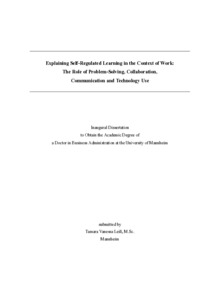|
Explaining self-regulated learning in the context of work: the role of problem-solving, collaboration, communication and technology use
Leiß, Tamara Vanessa
![[img]](https://madoc.bib.uni-mannheim.de/67800/1.hassmallThumbnailVersion/Dissertation_Tamara_Lei%C3%9F_final.pdf)  Vorschau |
|
PDF
Dissertation_Tamara_Leiß_final.pdf
- Veröffentlichte Version
Download (2MB)
|
|
URN:
|
urn:nbn:de:bsz:180-madoc-678006
|
|
Dokumenttyp:
|
Dissertation
|
|
Erscheinungsjahr:
|
2024
|
|
Ort der Veröffentlichung:
|
Mannheim
|
|
Hochschule:
|
Universität Mannheim
|
|
Gutachter:
|
Rausch, Andreas
|
|
Sprache der Veröffentlichung:
|
Englisch
|
|
Einrichtung:
|
Fakultät für Betriebswirtschaftslehre > Wirtschaftspädagogik, Lernen im Arbeitsprozess (Rausch 2016-)
|
|
Fachgebiet:
|
330 Wirtschaft
|
|
Freie Schlagwörter (Englisch):
|
workplace learning , learning in the workplace , self-regulated learning , problem-solving , social interaction , communication , technology use
|
|
Abstract:
|
Due to increasing digitalization, knowledge workers’ job profiles and working activities are increasingly shaped by the three components of complex problem-solving, collaboration and communication as well as technology (use). As a result, self-regulated learning (SRL), in the context of work-related formal as well as informal learning, is increasingly important in enabling knowledge workers to fulfill changing working tasks and requirements, to keep up with further changes, as well as to prepare young people for such work environments. These three major components and the resulting changes in working tasks and requirements not only necessitate learning but are also valuable sources for enhancing learning. Therefore, the aim of this thesis is to examine how employees’ and tertiary education students’ learning can be supported in settings with different combinations of these three major components.
Firstly, the influence of social interactions on vocational education and training (VET) students’ self-perceived informal workplace learning is investigated, also taking personal antecedents, contextual antecedents, and emotional experiences into account. Moreover, problem-solving and learning in a technology context are addressed. This comprises, on the one hand, the influence of solving software-related problems on workplace learning, again considering potential personal antecedents, contextual antecedents as well as emotional experiences. On the other hand, ERP software users’ availability and usage of different problem-solving activities is examined, with a special focus on so called Electronic Performance Support Systems (EPSS). Lastly, it is investigated which digital tools are used by higher education students for their Computer Supported Collaborative Learning (CSCL), how useful they are perceived to be, why the tools are used and for which activities within CSCL they are used.
The results of this thesis underpin the importance of social interactions, sometimes in collaborative contexts, as well as software-related problem-solving and tool use as activities that support informal workplace learning. Contextual and personal antecedents as well as emotional experiences also play a central role here. In addition, the research findings demonstrate the significance of technology and tools for remote CSCL, with a focus on learners’ agency within tool selection and the need for tool combination in CSCL. These results point to many areas where organizations and tertiary education institutions, as well as individual learners themselves, can take action to enhance SRL to be successful in digitalized workplaces.
|

 | Dieser Eintrag ist Teil der Universitätsbibliographie. |
 | Das Dokument wird vom Publikationsserver der Universitätsbibliothek Mannheim bereitgestellt. |
 Suche Autoren in Suche Autoren in
Sie haben einen Fehler gefunden? Teilen Sie uns Ihren Korrekturwunsch bitte hier mit: E-Mail
Actions (login required)
 |
Eintrag anzeigen |
|
